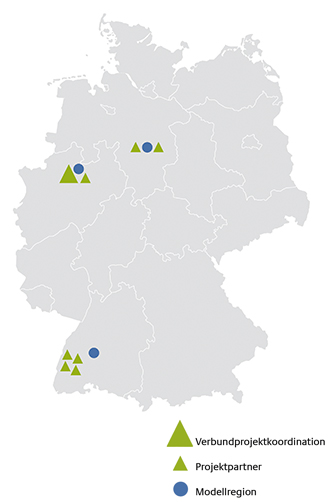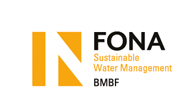WaSiG
Water balance in urban areas: planning tools and management concepts



MANAGING STORMWATER IN CITIES AND MUNICIPALITIES
The stormwater run-off in urban areas such as cities and municipalities is often an unknown factor of the hydrological regime. It still is frequently unclear where exactly the run-off flows to after a rainfall event: how high is the quantity infiltrating to the groundwater, what is the proportion of evapotranspiration? Surface sealing and drainage to the sewage system affect the water balance in urban areas, as well as the hydrological regime and its dynamics. Since the challenges are well known, there has been a paradigm shift in the management of stormwater in urban areas. Instead of conventional sewer systems, infiltration, retention and detention by means of permeable surface coverings, green roofs etc. are preferred. However, these measures do not necessarily mean that water bodies in urban areas regain their natural water balance.
Thus, for local authorities it is vital to know in advance what planning effort and costs will be associated with certain plans and structural interventions. Accordingly, the aim of WaSiG’s joint project partners is to optimise water resources management by providing local authorities and engineering and consulting offices with effective planning tools for the sustainable management of stormwater. Based on studies of various management measures, the joint project partners will develop a simulation model aiming at the calculation of the water balance. Subsequently, together with the municipalities involved in the project, they will analyse which are the most effective and efficient measures to keep the water in the area instead of draining it to the sewage system. Finally, WaSiG results will contribute to reduce the expenses for infrastructure investments.
GOALS
The project focuses on:
- Analysing the impact of stormwater managementinexisting quarters,as well as analysing and quantifying the respective processes resulting from current measures
- Developing realistic models concerning the sub-processes of water balance in meso- and micro-scale simulation models and defining objective criteria for the water balance applicable to water bodies in urban areas as a basis for planning
- Analysing the impact and resilience of rainwater management with regard to the impact of climate change
- Carrying out studies on the acceptance of management measures and on planning efficiency related to water-sensitive urban design and collecting valid data on the costs and operation of water management measures

Green roof in the quarter Vauban in Freiburg
MODEL REGIONS
The districts Kronsberg in Hanover and Vauban in Freiburg, which are well known for their exemplary character in the field of sustainable urban development, represent a very suitable platform for implementation and are accompanied by quarters in Münster.
Key messages
- The observed storm water control measures (SCM) are reliable in the long-term and are mostly seen in a favourable light by the general public.
- The land requirements for the SCM must be taken into account as early as possible during the urban land-use planning. Based on their practical experience, experts from the German cities of Freiburg, Hanover and Münster have formulated recommendations for administrative and operational practice.
- Hydrological models for simulating SCM were improved, supplemented with a newly developed module to calculate the potential evapotranspiration in urban areas, and validated using observed data. They are freely available as open source tools for end users and providers of specialised software.
- The water balance is an important and suitable criterion of urban land-use planning. Based on freely available data and on a generally accepted water balance model, there is a new GIS-based calculation approach by which a reference condition for the near-natural water balance (pre-developed state) can be determined.
- Guidelines for a hydrometric monitoring have been developed to determine the effectiveness of SCM in terms of water management.
Further Information
Kontakt
-
Fachhochschule Münster
Arbeitsgruppe Siedlungshydrologie und Wasserwirtschaft
Prof. Dr.-Ing. Mathias Uhl
T: +49 251 83 65201
M: uhl@fh-muenster.de -
Dr. Hedwig Roderfeld
T: +49 251 83 65349
M: hedwig.roderfeld@fh-muenster.de


 Deutsch
Deutsch




